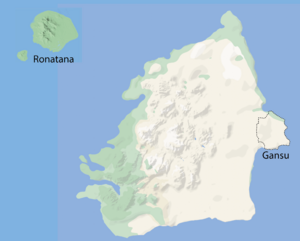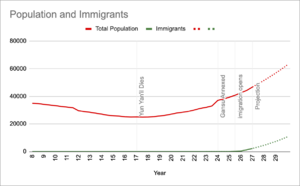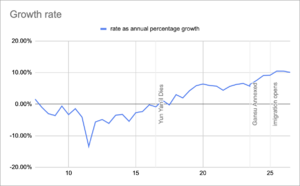Tun'ilhameng Liberation Procedure (Nation)
Tun'ilhameng Libertion Procedure | |
|---|---|
|
Flag of the TLP, hoisted from top edge | |
| Capital | Capitol Square, Rontanta Metropolitan Area |
| Largest city | Ronatana Metropolitan Area, Ronatana |
| Religion | Hangism, Atheism |
| Government | Autocratic Provisional |
• | Edward |
| Population | |
• Estimate | 30,000 ~ 50,000 |
| Currency | Ronatana Fol |
The Tun'ilhameng Liberation Procedure (TLP) is a nation controlled by an organization of the same name. Sometimes called "Ronatana and territories" to prevent confusion. The nation is disputed in nature, not being recognized by the Yotumic Divisionary Federation on Nongba, the nation which the TLP originates from. The TLP controls Ronatana, an island northwest of Nongba, and Gansu Port on eastern Nongba. The population is between 30,000 and 50,000, with most inhabitants living on Ronatana. The population is mostly Tun'ilhameng, 82% of whom are former slaves born on Nongba and forcebly transfered to Ronatana by the YDF, or were born on Rontana as slaves to the YDF.
The TLP has an alliance with the Akuta Pact to ensure protection from and to retaliate against the YDF and DHM in the current Nongban Civil War.
History

Government and Law
The Tun'ilhameng Liberation Procedure is operated by the Tun'ilhameng Liberation Procedure organization. The organization is regarded as simply provisional and autocratic. As the only remaining forced on Ronatana after the Ronatana crisis it assumed control of the island without electing a leader democratically. The current leader is Edward, who was appointed by a mob of Tun'ilhameng after an early slave revolt to represent them. The TLP has very little organization; no positions have official titles or consistence naming, and the duties and seniority of positions is not officially kept track of, with members expected to informally agree on and orally share with each other on what their duties are position in the heirarchy are.
The TLP generally lack centralization in their territory, offering very few services to inhabitants and struggling to keep track of data, including population size. in 23 PC the TLP government officially introduced a centralized currency, the Ronatana Fol. The TLP government had not begin collecting taxes until the 26pc fiscal year. Most money to the organization comes from aid with a very small amount being spent on the public.
Constitution
Sometimes called the "Code of Laws", the consitituion was introduced in 23PC to disambiguate practices the organization can perform and civilian affairs. There is no offical ruling on when or how the constition can be amended. The constitution is only amended by Edward. The complete text follows:
Article 1:
Section 1: It is through the shared power of members of the dearest Tun'ilhameng Liberation Procedure that this text is legally binding material on the island of Ronatana
Section 2: All members of the Tun'ilhameng liberation procedure have the right and solemn duty to enforce all laws this text hereby states in the most current form
Subsection 1: A member of the Tun'ilhameng liberation procedure is defined as any persons who is registered at the bureau and has either
• Fought in the great war against the Yotumic Divisionary Federation and has not laid down arms.
• Been appointed by a member who fulfills the aforementioned criterion.
Subsection 2: Any member that meets the aforementioned criterion can kill a person who is not a member if that person, within reasonable doubt, poses a grave and immediate danger to other people without punishment.
Section 3: A person found to have committed any of the actions or aided someone who has committed any of the actions listed below on the island of Ronatana must be subjected to the respective minimum punishment when it is possible for a member of the TLP to do so and no greater than the maximum punishment:
Subsection 1: Theft of property: someone or institution taking of any object that is not agreed to belong to them. Minimum punishment: half the monetary value of the item if there exists any difficult in procurement and the person found committing is greater than 10 years of age.
Subsection 2: Assult: someone or institution causing bodily harm to a human that results in any impairment of any duration or significant emotional damage of a substantial duration. No minimum punishment. Maximum punishment: exile from Ronatana.
Subsection 3: Murder and Manslaughter: the act of someone killing another human when that other human were not to die without the action done by that person that caused them to die. Mimimum punishment: 6 months captivity. Maximum punishment: execution at least one week after the perpetrator is caught.
Subsection 4: Rape: The act of forcibly penetrating a woman without express consent. Minimum punishment: 2 months captivity if pregnancy occurs. Maximum punishment: 1 year captivity
Subsection 5: Impersonation of a Tun'ilhameng Liberation Procedure member: someone found to claim they are currently a member of the Tun'ilhameng Liberation Procedure when they do not meet the criterion defined in section 2 subsection 1. Minimum punishment: 6 months captivity. Maximum: Execution at least one week after the perpetrator is caught
Subsection 6: Slavery and Servitude: A person who forces a human to work without being regularly paid in any good. Minimum punishment: Exile from Ronatana. Maximum punishment: Immediate execution.
Amendment 1: Currency
Section 1: it is the case that the Tun'ilhameng liberation procedure will now regulate the bank note called the "Ronatana Fol".
Section 2: The Ronatana Fol is defined to be valued as the amount of dry grain that can fit into a small bowl.
Section 3: Members of the Tun'ilhameng liberation procedure appointed by the uppermost member are the only persons allowed to manufacture marks of the Ronatana Fol.
Subsection 1: Reproduction of the Ronatana Fol by any person who is not a member of the Tun'ilhameng Liberation Procedure and not appointed by the uppermost is guilty of counterfeiting. Minimum punishment: twice the value of the currency counterfeit as defined in section 2.
Section 4: It is hereby the case that an employer of a business who does not pay their employees at least three (3) Ronatana Fol every day is guilty of Slavery as defined in Article 1 Section 3
Subsection 6. Amendment 2: Citizenship Section 1: It is hereby recognized that a person can be a citizen of Ronatana which entails the following rights and responsibilities:
Subsection 1: A citizen has an inalienable right to own land on Ronatana as registered with the Bureau.
Section 2: Any person, dead or alive, who fulfills any of the following criteria without being exiled is entitled to citizenship when filled with the Bureau.
• Being an active member of the Tun'ilhameng Liberation Procedure.
• having at least one (1) parent who has a majority Tun'ilhameng heritage.
Subsection 1: Citizenship cannot be removed without the formal process of exile. Subsection 2: Exile entails a person being registered as exiled and neither themself nor parts of themself allowed to preside on Ronatana.
Section 3: Any person who fulfills all the following criteria but did not meet the criterion in section 1 can apply for citizenship with a reserved right of the Bureau to deny the application for any reason:
• Is alive
• Is living in Ronatana as a permanent resident. • Does not own land on another nation during time of application.
• Has not been denied application within the past year. • has not been exiled • Is a member of any of the following ethnicities: Utlian, Tieteran, Akarian, Niueyjaran, Modhi, Merriyian.
• Does not have Nongban ancestry unless it is proven that all ancestry results from rape or sexual assault prior to 7PC.
Subsection 1: Someone who has their application accepted will be known as an immigrant unless exiled.
Amendment 3: Taxation
Section 1: It is hereby the case that members of the Tun'ilhameng Liberation Procedure are allowed to collect Income tax and Employer Payroll tax in the form of Ronatana Fol from citizens and institutions defined as being within the following group with respective rates if taxes were not already collected in the fiscal year.
Subsection 1: Income tax is defined as a monetary portion of a citizen's income that the Tun'ilhameng Liberation Procedure is entitled to.
Subsection 2: Employer Payroll tax is defined as a monetary portion of an employee's paycheck that an employer must pay to the Tun'ilhameng Liberation Procedure on top of the paycheck they gave their employee.
Subsection 3: Failure to pay taxes within the fiscal year is a crime hereby known as tax evasion. Minimum punishment: fine equal to the monetary amount of taxes owed. maximum punishment: Exile.
Section 2: the following peoples and institutions are required to pay all taxes with the respective rates:
• Employers of business whose totally employment makeup is 95% or greater immigrant or noncitizen. 0% income tax 6% payroll tax.
Demographics


The TLP has a population estimated to be between 30,000 and 50,000. The population declined during the Ronatana Crisis and has had a significant birth rate increase since the departure of Yun Yan'il. The current annual growth rate now at 10%. The nation is currently expiriencing an immigration boom. About 2,000 or 5% of the population are immigrants, almost all from Utlia and Akaria. There are 16,829 registered citizens, estimates conclude between 50% and 70% of the population has not gained citizenship.
While no definitive income can be used to peg poverty in the TLP, if it is assumed one needs atleast 6 Fol a day to support themselve then around 60% of the nation is below this poverty line. The employement rate is 70%. The median income is 30.2 Fol per week or 1570 Fol per year (~11 Utlian Dolare or ~35 Tietero Dolaro). The majority of immigrants live in Port Harold with a significantly higher income than the Tun'ilhameng populace. The employment rate of immigrants is 93% and the median income is 170 Fol per week or 8840 Fol per year (~64 Utlian Dolare or ~196 Tietero Dolaro) making their income more comporable to their home countries.
The Tun'ilhameng of the TLP have a fertility rate of 4.6 children per woman while immigrants have a fertility rate of 2.3 children per woman. The infant mortality of Tun'ilhameng is 51 per 1000 live births while immigrant have an infant mortality of 10 per 1000 live births.
